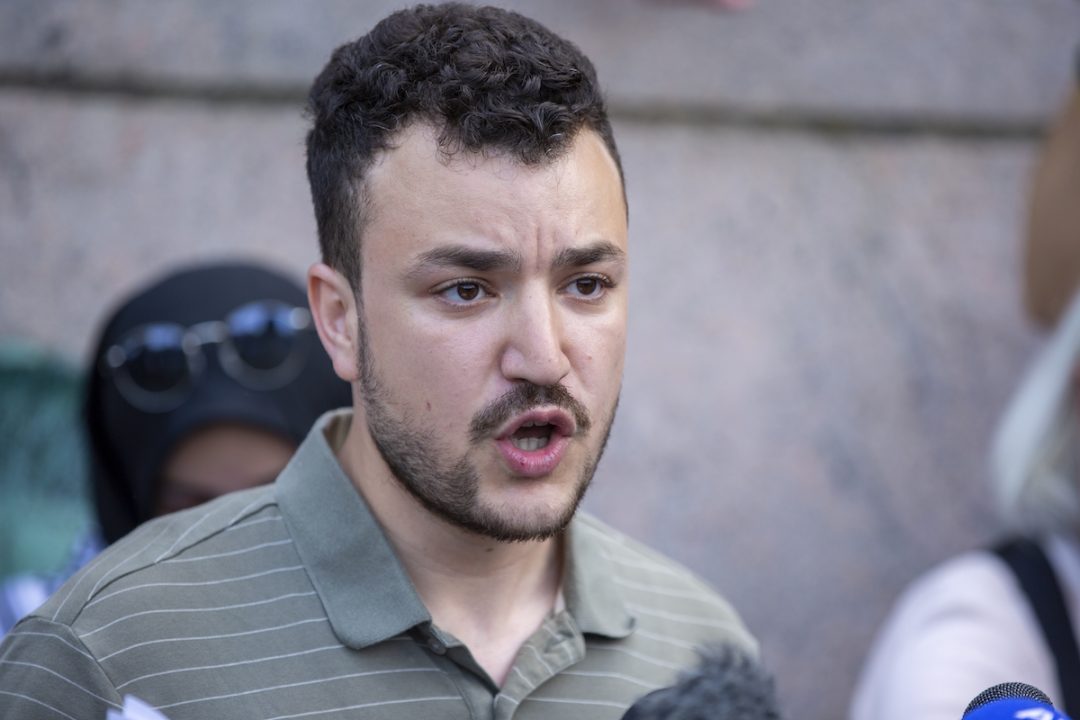
A federal judge ruled this week that the Trump administration’s effort to deport Mahmoud Khalil is “unprecedented” and “likely” unconstitutional. Secretary of State Marco Rubio personally signed off on Khalil’s removal, arguing the activist’s presence could harm U.S. foreign policy.
Khalil is a legal U.S. resident, a Palestinian graduate of Columbia University, and a key organizer of campus protests against Israel’s assault on Gaza — the military operation that is widely described as involving war crimes, ethnic cleansing, and genocide. Khalil also condemned the Biden and Trump administrations’ unwavering support for it.
The Ruling
In a 106-page opinion, U.S. District Judge Michael Farbiarz rejected Rubio’s use of 8 U.S.C. § 1227(a)(4)(C), a rarely invoked statute that permits the removal of noncitizens if their “presence or activities” pose “serious adverse foreign policy consequences.”
Framing the core constitutional question, Farbiarz wrote that the case was not yet about the First Amendment:
Rather, the issue now before the Court has been this: does the Constitution allow the Secretary of State to use Section 1227, as applied through the determination, to try to remove the Petitioner from the United States?
The Court’s answer: likely not.
The judge argued that Rubio’s justification lacked specificity and likely violated the constitutional requirement for clear legal standards, especially where the underlying conduct involved “otherwise lawful” speech. He wrote:
An ordinary person would have had no real inkling that a Section 1227 removal could go forward in this way — without the Secretary first determining that there has been an impact on American relations with another country.
He continued:
Arbitrary enforcement is not just a danger when many people enforce the law. It can also be a danger when one person is given the job, if his determination veers too far away from the standard set down by Congress. Here, the Secretary’s did.”
Still, the judge did not order Khalil’s release. He asked for further briefing on the government’s separate claim that Khalil failed to disclose his involvement with certain organizations on his immigration paperwork. That issue, Farbiarz said, must be resolved before ruling on Khalil’s detention.
Congress Never Approved This
As reported by Lawfare in March, the deportation of a lawful permanent resident (LPR) requires more than vague executive claims. Per the outlet:
Since Fong Haw Tan v. Phelan (1948), the Supreme Court has recognized that deportation of an LPR is a “drastic measure” — a “forfeiture” of ties with family, friends, and community. The Court has required a “clear statement” from Congress that the legislature’s plan included this harsh result. That clear statement is absent here.
The outlet further describes that Congress has always treated LPRs differently from visa holders. It has also rejected efforts to censor foreign nationals’ speech. The 1990 Immigration Act, which introduced the foreign-policy removal clause, explicitly warned it could not be used based on “the possible content of an alien’s speech.”
Lawmakers limited that power to cases involving “imminent harm to the lives or property of United States persons abroad.” Neither Rubio nor the Department of Homeland Security (DHS), acting on his request, offered any concrete evidence of such a threat in Khalil’s case.
Without a clear congressional mandate to strip legal residents of their rights for engaging in protest, courts should reject this abuse, concluded the report.
Alleged Omissions
Alongside its foreign policy claims, the Trump administration has accused Khalil of lying on his green card application.
In filings submitted to immigration court, officials say Khalil failed to disclose past affiliations and work history. These include a short-term position with the United Nations Relief and Works Agency for Palestine Refugees in the Near East (UNRWA) in 2023 and extended employment with the British Embassy in Beirut. The administration also cites his involvement with Columbia University Apartheid Divest (CUAD), a student group that campaigns for divestment from companies tied to Israeli military operations.
Farbiarz acknowledged the claims in his opinion, but drew a sharp line. To reiterate: The core of the case, said the judge, is about whether the Constitution permits the use of Section 1227 against someone engaged in lawful protest.
The judge declined to rule on the omission allegations for now. Instead, he requested more legal arguments from both sides.
Khalil’s Case
Immigration and Customs Enforcement (ICE) agents detained Khalil in the lobby of his Columbia University housing unit on March 8. Initially, they claimed he had violated visa terms. However, upon discovering that he held a valid green card, the justification for his arrest shifted.
Notably, the Department of Homeland Security later admitted in court filings that agents did not have a warrant at the time of arrest, citing “exigent circumstances” due to an alleged flight risk. This claim is contested by Khalil’s legal team, who argue that he was cooperative during the encounter. Video footage of the arrest, recorded by Khalil’s wife, appears to support this assertion.
Faced with growing scrutiny, DHS turned to a different rationale. Pressed for evidence, the agency produced a two-page memo from Rubio. Submitted in immigration court, it claims Khalil took part in “antisemitic protests and disruptive activities” that allegedly created a “hostile environment for Jewish students in the United States.”
Rubio does not accuse Khalil of any crime. Instead, he argues that Khalil’s continued presence could “undermine the U.S. policy in fighting antisemitism around the world and in the United States” and jeopardize efforts “to protect Jewish students from harassment and violence in the United States.”
Broader Crackdown
Khalil’s case is not unique. It is part of a broader crackdown on pro-Palestinian activism disguised as national security.
Since early 2025, ICE has arrested or targeted at least a dozen foreign-born students and legal residents for protesting Israel’s actions in Gaza and the U.S.’s full backing of them. As with Khalil, they have not been charged with any crime.
Among them is Mohsen Mahdawi, a Palestinian student at Columbia, detained during an apparently routine immigration check. A judge ordered his release for lack of evidence.
In Massachusetts, Turkish doctoral student Rümeysa Öztürk was jailed and stripped of her visa after co-authoring an op-ed critical of Israel. She spent weeks in ICE custody before securing bail.
At least 10 others — mostly from elite universities — have faced canceled visas, surprise detentions, or administrative holds. The common thread: They criticized Israel.
Additionally, the Trump administration has aggressively pressured top universities to silence pro-Palestinian protests by labeling them “antisemitic,” conflating political dissent with hate speech.
What’s Next for Khalil
Khalil’s legal battle is far from over. While Judge Farbiarz’s ruling dealt a blow to the administration’s case, Khalil remains in jail under a separate ruling from an immigration judge in Louisiana.
That court found him deportable on national security grounds; Khalil’s legal team promptly initiated an appeal. Unlike federal judges, immigration judges — employees of the Department of Justice (DOJ) — are not empowered to fully assess constitutional violations.
Khalil’s attorneys said they will comply with Farbiarz’s request for additional filings and continue fighting to secure his release.
In the meantime, the judge has barred the activist’s deportation until his constitutional challenge is resolved.
Related:
Trump’s Deportation Policies: Curtailing Free Speech, Shielding Israel?
State Department Rolls Out AI to Track Online Activity, Revoke Student Visas





